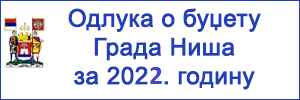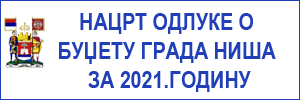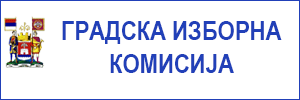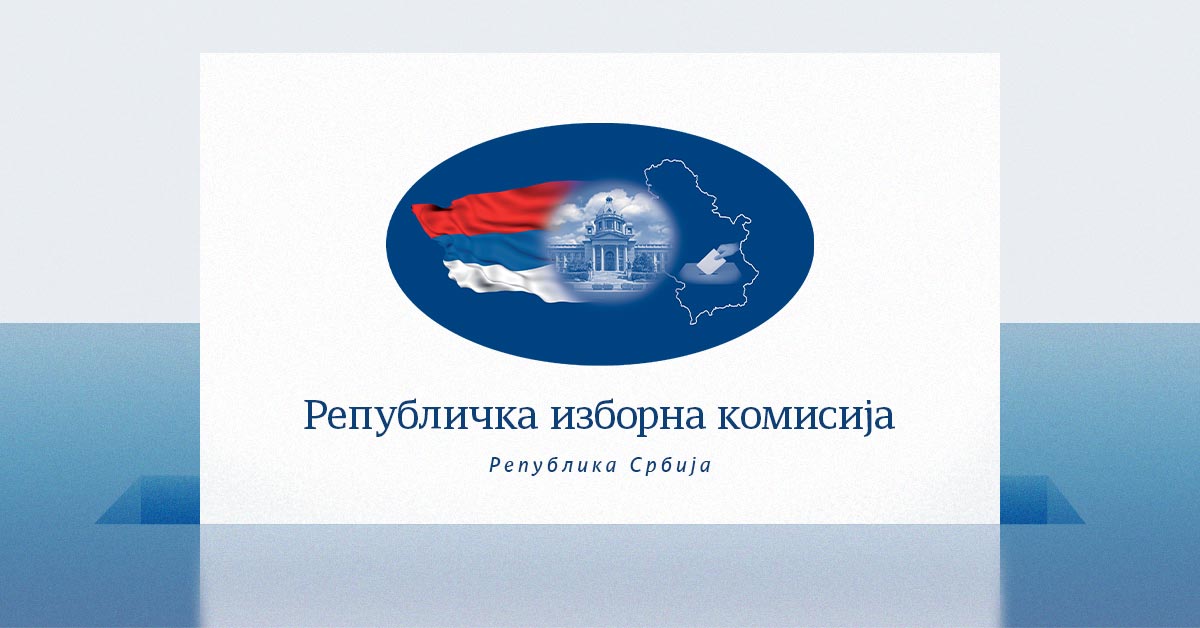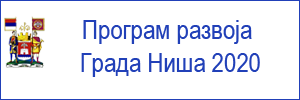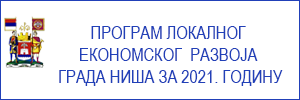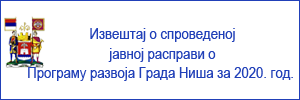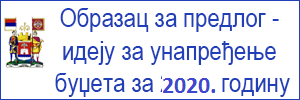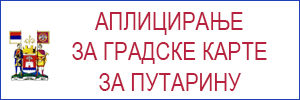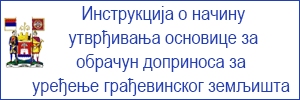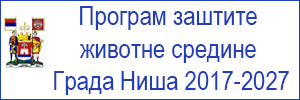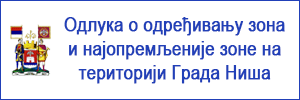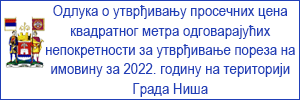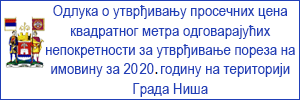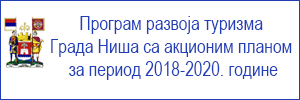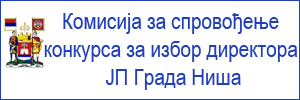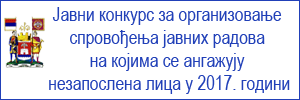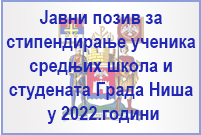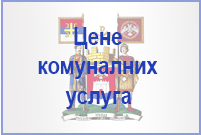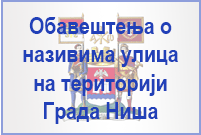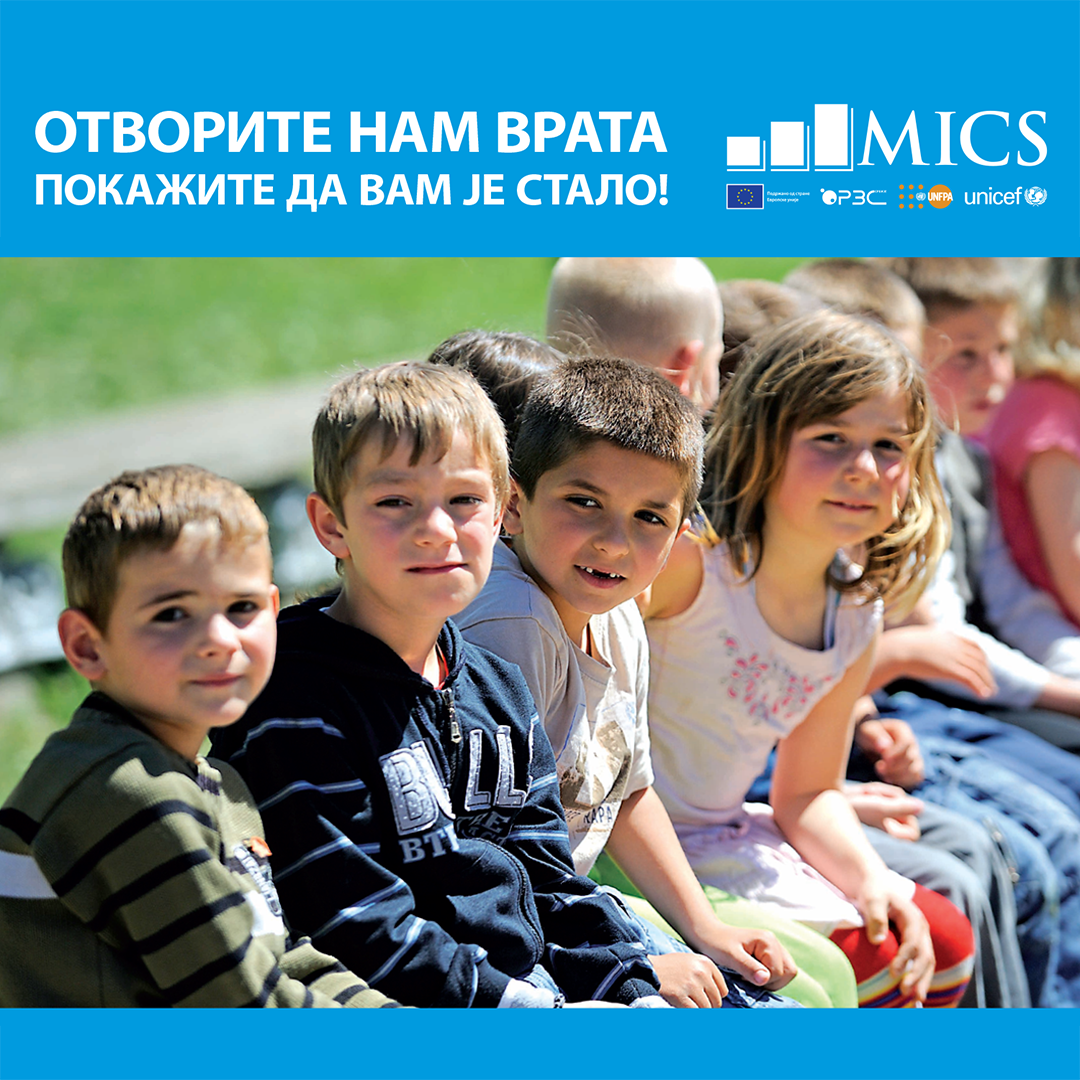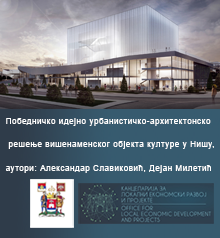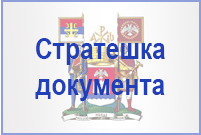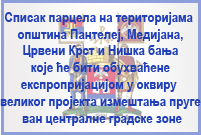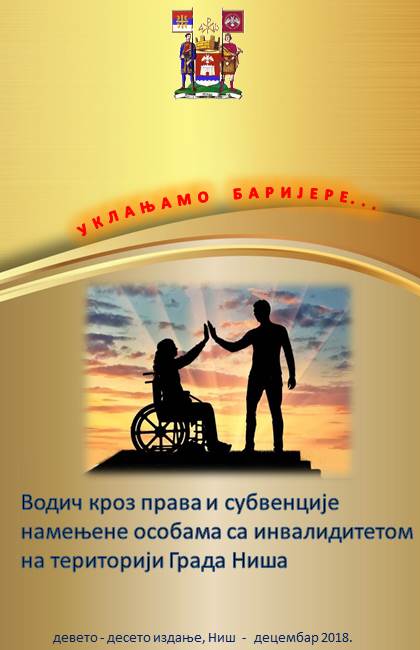2021
Strengthening Mechanisms for Gender Equality in the Nišava District
The project Strengthening Mechanisms for Gender Equality in the Nišava District was approved for funding under the program Swiss Government Support to Municipal Development through Improving Good Governance and Social Inclusion-SwissPRO. The project is funded by the Swiss Government and implemented by the United Nations Office for Project Services (UNOPS) The overall goal of the project is to contribute to improving the operational capacity of local gender equality mechanisms to actively address gender equality policies and gender issues in the community by educating members of local gender equality mechanisms in the Nišava District. The specific objectives of the project are: strengthening the capacity of seven local mechanisms for gender equality in the City of Niš by holding three two-day trainings for at least twenty participants on project writing and project cycle management, good governance and gender policies and support for networking of local gender mechanisms on the territory of the City of Niš and the municipalities of Doljevac, Aleksinac, Svrljig, Gadžin Han, Merošina and Ražanj, in order to increase achievements and influence through the formation of a regional network of mechanisms for gender equality of the Nišava district. The key activities of the project will be implemented in cooperation with city municipalities and municipalities in the region. The expected effects of the project are: 1. contribution to the institutional strengthening of the mechanisms for gender equality in the promotion and advocacy of gender equality in local communities, 2. Local gender equality mechanisms recognized as active factors in the implementation of local policies that participate in processes from a gender perspective. The total value of the project is $ 3,992.00 and the entire amount will be funded by donors. The project implementation time is eight months.
2020
Management of Glass Packaging in the Western Balkans
The City of Niš along with Public Utility Company for Waste Management Mediana participate in the develoPPP program funded by the German Federal Ministry of Economic Cooperation and Development via German Development Cooperation – GIZ with the purpose to improve the rate of collection and recycling of glass packaging, develop regulatory solutions and raise awareness on the importance of recycling. Apart from Niš, the regional project Management of Glass Packaging in the Western Balkans is being implemented in Sombor, Kragujevac and Varvarin, as well as in selected pilot municipalities in Bosnia and Herzegovina and Northern Macedonia by National Alliance for Local Economic Development in Serbia, the Regional Development Agency of Herzegovina (REDAH) and the Association of Local Self-Government Units (ZELS) from Northern Macedonia together with packaging waste operators – Sekopak, Pakomak and Ekopak. Only 44% of glass packaging is recycled in Serbia, 30% in Northern Macedonia and 12% in Bosnia and Herzegovina, which is insufficient to establish a cost-effective recycling system in the Western Balkans. Since there are no recycling plants in the region, glass packaging must be exported and this is an additional cost for packaging waste operators. Consequence of such a system is that most used glass packaging ends up in landfills or illegal dumps, where glass needs more of 5,000 years to disintegrate. One of the project goals is a 20% increase of the collection rate and recycling of glass in the selected municipalities in all three countries. The project will prepare a Guide for local governments to establish an efficient and cost-effective glass packaging management system and the project also aims to contribute to improving the implementation of laws and regulations in the field of environmental protection which is also a direct contribution to further EU accession and harmonization of rules and regulations. Within the project activities, on the territory of the city of Niš, 300 containers will be placed. The value of the project for the City of Niš is € 150,000. Implementation period: February 2020 – October 2022.
Future Cities of Southeast Europe
The project Future Cities of Southeast Europe is financially supported through the EU initiative Climate-KIC of the European Institute of Innovation and Technology and is implemented in 5 pilot cities that, according to estimates, have the capacity for systemic transformation of cities: Sarajevo (Bosnia and Herzegovina), Skopje (Northern Macedonia), Križevci (Croatia), Maribor (Slovenia) and Niš (Serbia). The project should enable faster and easier systemic changes through innovations, in order to achieve a better quality of life for citizens and the necessary decarbonisation in those activities that have a critical effect on greenhouse gas emissions. As technological innovation alone will not, over time, achieve the structural changes needed for progressive growth, the project will combine a variety of innovation methods in the areas of finance, business models, regulatory frameworks, behavioral perceptions and social norms, education and skills, new and existing technologies , citizen participation, market structure, etc. The project leader is the Climate-KIC initiative and the partners in Serbia are the Chamber of Commerce of Serbia, Science and Technology Park Niš. The City of Niš has accepted participation in the project in the time frame 2020-2022. The precondition for the realization of the project for each year is the adoption of the annual plan. In 2020, the City of Niš decided to set the planned systemic changes through the most important planning document – the Development Plan of the City of Niš for the period from 2021 to 2027. The benefits of implementing the annual project plan for 2021 are reflected in focusing on the following areas: climate change, digitalization and smart cities, the transition to a low-carbon energy supply and circular economy, urban development and sustainable management. Various innovative tools will be used to identify pilot initiatives, such as hackathons, challenges, innovation camps, as well as “world cafes”, “placemaking” workshops, and “design thinking”.
mPOWER
The City of Niš has joined the mPOWER project funded by the EU Horizon 2020 Research and Innovation Program and includes seven partner organizations. The project started in May 2018 and will last for four years. mPOWER is run by a consortium composed of the University of Glasgow (UK), Platform (UK), Transnational Institute (Netherlands), Energy Cities (EU-wide), IPE (Croatia), University of the Basque Country (ES), and Carbon Co-op (UK). mPOWER will enable an in-depth, wide-scale and systematic peer-to-peer learning programme among at least 100 local public authorities, in order to replicate innovative best practices in municipal energy, and developing ambitious energy transition plans. mPOWER maps existing municipal energy policies and identifies innovations, best practices, barriers and barriers. The City of Niš is one of dozens of European cities that, through various phases of the project, have the opportunity to learn the best examples of practice in the field of local energy. The project prepared a plan for establishing office for advisory assistance to citizens for energy efficiency of buildings, published a blog on energy transition in the City of Niš (mPOWER Exchange), prepared a documentary on energy transition in Niš City which serves as educational material for cities attending the course within this phase (mPOWER Digital), and a joint application with the City of Burgas for the project of establishing energy cooperatives (mPOWER Activate).
2019
PLATFORM FOR RESPONSIBLE PUBLIC FINANCIAL MANAGEMENT
The Government of Sweden-funded United Nations Development Program (UNDP) Project Platform for Responsible Public Financial Management will work to strengthen partnerships between local government units and civil society by building a more transparent approach to funding civil society organizations from local government budget in accordance with local needs. The project will also contribute to the implementation of the Sustainable Development Goals of the 2030 Development Agenda. In accordance with the principles of participatory democracy and European Union standards the priorities are strengthening responsible local government, transparency and governmental actions towards the needs of citizens, as well as enhancing public and citizen participation in public policy-making. The Sustainable Development Goals are a universal call to action to eradicate poverty, protect the environment and ensure peace and prosperity for all. The aim of the project is to provide technical support to selected local governments: Bac, Raska, Vrnjacka Banja, Valjevo and Nis to adopt and implement a more transparent, development-oriented and project-based approach to NGO funding over the next two years. They will commit themselves to allocate funding for NGO projects more transparently, that is, to apply transparent criteria and procedures in the allocation of public funds and to allow a participatory approach in defining local priorities
GOVERNMENT ACCOUNTABILITY INITIATIVE
The Government Accountability Initiative is (GAI) is a four-year, $8.5 million activity intended to foster government accountability and to increase connections among and between government bodies and members of the public. GAI supports accountability at all levels of government in Serbia through three parallel components: – (1) selected local self-governments, (2) independent oversight institutions and (3) specialized anticorruption courts and public prosecutors. GAI’s expected results are: Increased public participation in local government decision making and oversight; Enhanced government performance and accountability through risk-based prevention and detection of corruption; Increased efficiency in adjudication of corruption cases by courts and prosecutors. Within the project, the City of Niš was granted technical assistance in the areas of strengthening transparent, inclusive and accountable local government, in line with the project objectives. This includes providing appropriate technical support, including training focused on local government transparency and public participation in decision-making, as well as the opportunity for the City of Nis to participate in other activities that may include exchanging experiences between local governments, training on specific topics relevant to local governments and discussions on relevant policies.
NEAR – Nis Employment Action for Roma
The City of Nis has accepted the implementation and co-financing of the project NEAR – Nis Employment Action for Roma, for which the City of Nis and the Citizens’ Association Roma World Production have applied under the EU SUPPORT TO ROMA INCLUSION Program – Empowering Local Communities for Roma Inclusion. This Program is funded by the European Union, while the Contracting Authority is the Standing Conference of Cities and Municipalities (SCTM). The overall objective of the project is to contribute to the socio-economic inclusion of the Roma population and their families in society in support of the implementation of the Strategy for Social Inclusion of Roma in the Republic of Serbia 2016 – 2025. The specific objective of the project is to increase the social inclusion and economic position of Roma families in Nis through the implementation of tailored active employment measures. The promoter and implementer of the project is the City of Nis, and the partner in the project is the Citizens’ Association Roma World Production. The total value of the project is 74,016.59 EUR (9,252,073.75 dinars), of which the European Union finances the project in the amount of 59,612.96 EUR (7,451,620.00 dinars) or 80.54%, and the City of Nis co-finances the project in the amount of EUR 14,403.63 (RSD 1,800,453.75) or 19.46%. Of the part representing the participation of the City of Nis EUR 13,200.00 (RSD 1,650,453.75) is financed through the work of employees of the local self-government bodies working on the project.
United Europe – Security, Solidarity and Stability
The City of Nis has accepted the participation in the project “United Europe – Security, Solidarity and Stability for All”, implemented by the Municipality of Sliven, Bulgaria and funded by the European Union within the program Europe for Citizens. The aim of the United Europe-Security, Solidarity and Stability for All Project is the cooperation of local authorities in Sliven (Bulgaria) with the cities of Nis (Serbia) and Bydgoszcz (Poland) in European contexts and promotion of solidarity in times of crisis, their mutual cooperation in economy, education, health, social activities, tourism and the arts, as well as intercultural dialogue and mutual understanding. The project leader is Sliven Municipality, Bulgaria, and the partners in the project are the City of Nis, Serbia and the City of Bydgoszcz (Poland). The time of realization of the proposed project is in the period from 08/09/2019 until 29/09/2019. The total value of the project is EUR 24 990 and the project is fully funded by EU funds. Activities within the project are divided into the following activities: 1) An international meeting to sign the Letter of Intent; 2) Cultural Forum Europe – Our Common European Home; 3) Economic Forum “The future of Europe – Employment, Growth and Investment – We Can Do More Together” 4) Youth forum on “United Europe – Security, Solidarity and Stability”.
Improving Young Roma Employment
The City of Nis accepted the establishment of cooperation with the Roma Education Fund on the implementation of measures and activities related to the improvement of the position of Roma within the framework of the projects “Improving Young Roma Employment”, Phase II, with the support of the German financial cooperation program implemented by the German Development Bank KFW on behalf of the Government of the Republic of Germany-Ministry of Economic Cooperation and Development. The objective of the project is to promote employability and increase the competitiveness of members of the Roma national minority in the labor market. The project includes practical assistance, creating effective and efficient mechanisms necessary to combat discrimination and the creation of conditions in which Roma can exercise all rights with a focus on access to the education system and employment. Through the project various vocational trainings, internships in the public and private sectors are realized, thus enabling young Roma to improve their skills, competences and become competitive on the labor market. Within the project, mechanisms will be established that continuously improve the professional skills of users and promote their employability. Employment of young Roma men and women is a complex and multidimensional process in which it is necessary to establish cooperation with the employers from public and private sector, while, at the same time, implement activities that strengthen the competence of young Roma for the labor market. Establishing cooperation is aimed at attracting employers and actively contributing to the creation of stimulating employment conditions for young Roma through a developed individual approach with a special emphasis on the principle of gender equality. The time for realization of the cooperation is until the completion of the project, i.e. November 2021.
Supporting Socio-Economic Stability in the Region of the Western Balkans 2019-2020
The City of Nis accepted the participation and co-financing of the project “Supporting Socio-Economic Stability in the Region of the Western Balkans 2019-2020”, which is financed by the German government and implemented by HELP-Hilfe zur Selbsthilfe e.V. in cooperation with local partners, municipalities and cities in Serbia. The project objective is to increase the capacity of economically and socially vulnerable population groups and to improve treatment programs in institutions for the enforcement of criminal sanctions and reintegration processes and their full involvement in society. The total value of the Program at the level of the Republic of Serbia is 969.230,00 Euros. The value of the Project for the City of Nis is 72,000 euros, of which the City co-finances the project in the amount of 28,800.00 euros and the Government of the Republic of Germany with funds in the amount of 43,200.00 euros. The project will be implemented in the territory of the City of Nis in the period from the signing of the Contract until December 31, 2020. The project is based on educational and economic support to the local development of the City of Nis, with the implementation of mechanisms for strengthening the development of micro businesses in the city. The main activities will concentrate on the direct opening of new jobs, through the help to small businesses in the form of grants, organizing business and vocational training. HELP-Hilfe zur Selbsthilfe e.V. will support the implementation of existing local development strategies and support the sustainable development process as a whole. Within the project, at least 30 micro businesses in Nis will be supported in their intentions for starting or developing business activities. Support includes: donation in equipment or material with an average value of EUR 2,400.00; organization of business and professional training according to user’s needs.
Improvement of the Geographic Information System of the City of Nis
The project “Improvement of the Geographic Information System of the City of Nis” was approved for financing in the framework of a call for proposals for the introduction and development of Geographic Information Systems (GIS) within the framework of the EU Program for Support to Local Self – Governments EU-PRO. The overall goal of the project is to improve the capacity of the City of Nis as the local government to identify, regulate and integrate management and use of geospatial data by improving the functionality of existing GIS. The specific objectives of the project are: 1) creating conditions for improving the planning process in Nis through the design, construction and testing of user-friendly tools that can be accessed via the Internet and allowing decision makers to examine, visualize and report on the effective status of each layer and use the model of results to recognize and obtain the necessary information to determine the priorities of the geographic areas in order to achieve the objectives in each priority area on multiple levels, 2) providing institutional support and effective and efficient management of geographic information systems in Nis. The implementation of this project envisions the establishment of a GIS-based information system with the aim of analyzing data for the needs of city planning, monitoring changes, prevention in certain sectors, implementation of planning documents, improving tax collection, asset management and evaluation of the implementation of plans and programs. The information system will contribute to a simpler and more efficient management of a complex set of different data, which will increase the efficiency in making timely measures and activities necessary for a balanced and controlled development of the socioeconomic and ecological potential of the City of Nis. This will simultaneously improve the spatial planning system in the Republic of Serbia by adjusting and strengthening the institutional and organizational capacities for the application of modern information technologies. One of the basic goals of establishing GIS is the contribution to the formation of spatial data infrastructure, which creates the conditions for the integration of technologies, spatial data, numerous users, etc., which are necessary for the active role of planners in the future planning process. The City of Nis within the EXCHANGE 5 Program is implementing the project “Effective and Efficient Property Management in Nis and Cuprija through the Introduction of the Geographic Information System” within which legal bases for the development of GIS will be established, which implies the adoption of agreements and protocols on cooperation between institutions, the members of GIS, then the development of a software solution for the basic GIS, which will establish a basic GIS system (which involves the purchase of appropriate licenses, the procurement of hardware components, training as well as the input of currently available data.) The layer “property” will be created where the data on real estate in the ownership of the city will be entered as well as the base of investment potentials of the city with the display of locations. With the project “Improvement of the GIS of the City of Nis”, the activities of upgrading the GIS will be realized by introducing new layers from the priority areas: spatial and urban planning; improving public infrastructure; local economic development and investment promotion; tourism and cultural and historical heritage; preservation and valorization of natural, cultural, architectural and civil heritage, emergency situations, environmental protection, agricultural and rural development, creation of GIS layers for the presentation of land classification and parcel classification and development of new tools and functionalities (development of 3D analysis modules and visualization of data, development of support for online background layers, development of GIS tools for geo-referencing of raster data) as well as creation of an android mobile application for access to the Geographic Information System. The proposed value of the project is EUR 105,700.00. Participation of the EU Program for Support to Local Governments EU-PRO in financing the implementation of the project is 81.55% and the City of Niš is 18.45%.
Project Tomorrow within HORIZON 2020 Programme
The City of Nis accepted the participation in the project TOMORROW, which is realized within the partnership led by the Energy Cities Association, financed by the European Union within the HORIZON 2020 Programme (H2020 framework LC-SC3-EE-16-2018-2019 -2020, Providing Support to Public Authorities in the Implementation of the Energy Union), while the Contracting Authority is the European Commission. The overall objective of the TOMORROW project is to empower local authorities to lead the transition to cities with low greenhouse gas emissions, which are more resistant to climate change and generally more pleasant for the lives of citizens by engaging citizens and stakeholders in development of the Energy Transition Road Map by 2050. The specific objectives of the project are: development of local “Energy Transit Road Map by 2050” for pilot cities, as ambitious and efficient tools for launching the process of decarbonisation and sustainability and launching their implementation; developing an innovative engagement process for developing road maps in pilot cities and continuing to encourage the engagement of a larger number of stakeholders and citizens; promoting road maps among EU cities as a new, efficient and collaborative approach to governance in order to make cities more suitable for life; training public officials to develop the role of leaders in transition and to improve their capacity to engage citizens, in particular through peer to peer approach; making recommendations in order to improve the legal, financial and socio-economic environment at the EU and national level. The leader in the project is Energy Cities, the scientific partner of the project is the Dutch Research Institute for Transition – DRIFT, and the partners are the cities of Brest (France), Dublin (Ireland), Brasov (Romania), Valencia (Spain), Mouscron (Belgium) and Nis (Serbia). Project implementation time is 36 months. The total value of the project is 1,499,767.50 euros, and the project is fully funded by the European Union. The value of the project for the City of Nis is 79,198.75 euros.
Together for Community Programme New Cycle
The focus of the Together for the Community 2019 programme, implemented in cooperation with the Ministry of Health of the Republic of Serbia and 13 local governments, is the improvement of conditions in healthcare institutions, primarily those responsible for the healthcare of children and youth. This priority was recognized after consultation with representatives of local communities participating in the programme and examining the needs of citizens in those communities. Renewed infrastructure, more modern equipment and more humane conditions for all users are necessary elements for improving operation of each healthcare institution in Serbia, and the support to capital projects under this year’s programme will contribute exactly to this, in order to make long-term progress for the local community. Cities and municipalities where the programme is implemented are: Belgrade, Novi Sad, Nis, Cacak, Zrenjanin, Pančevo, Kikinda, Pozarevac, Kanjiza, Novi Becej, Srbobran, Zitiste and Plandiste.
Open Data Open Opportunities
City of Nis joined the Project Open Data – Appear on the Map implemented by Association PALGO smart which is supported within the Platform Open Data – Open Opportunities implemented by the Office for IT and E-Government and UNDP Serbia, with the support of the World Bank, the Good Governance Fund of Great Britain (GGF) and the Swedish International Development Cooperation Agency (SIDA). The project provides support to institutions in the process of opening up their data, but it also supports IT companies, civil society organizations and others who are interested in using this data creatively. Opening of the data owned by public institutions for their reuse is a strategic commitment of the Government of the Republic of Serbia and it is reflected in the Strategy for e-governance development in the Republic of Serbia for the period from 2015 to 2018 and in the Action plan for the implementation of the international initiative Open Government Partnership (OGP) in the Republic of Serbia for 2016 and 2017. The project follows the recommendations set out in the Open Data Readiness Assessment conducted by UNDP and World Bank. On a wider scale, the project will contribute to efficient implementation of the Public Administration Reform Strategy and bring Serbia closer to the best European and global practices in the field of good governance. The purpose of the cooperation of the City of Nis in the Project is to raise awareness of the need for quality collection, input and reuse of data, to introduce the concept and mechanisms of the process of opening data in the City of Nis administration, to improve the capacity of the City of Nis through mentoring, as well as to open datasets on the web site of the City of Niš and on the National Open Data Portal.
Energy Efficiency in Public Buildings
The City of Nis has accepted cooperation on the project Energy Efficiency in Public Buildings-DKTIEE, implemented by Deutsche Gesellschaft für Internationale Zusammenarbeit (GIZ) GmbH, supported by the Ministry for Economic Cooperation and Development of Germany, in partnership with Republic of Serbia line ministries: the Ministry of Mining and Energy, which is in charge of energy, efficient use of energy and energy efficiency, as the main political partner, as well as with the Ministry of Construction, Transport and Infrastructure, which is in charge of energy in building efficiency. GIZ and the City of Nis will cooperate to improve energy efficiency in public buildings at the local level by encouraging decision-making on the rehabilitation of buildings and developing the capacities of relevant stakeholders. The overall goal of the project is to improve energy efficiency in the Republic of Serbia. The specific objective of the project is to increase energy efficiency in public buildings with a focus on 6,500 schools and kindergartens in Serbia. The expected results of the cooperation for the City of Nis are as follows: improved legal framework conditions for increasing energy efficiency; the City of Nis will be able to strategically plan the renovation of schools and kindergartens and adopt investment decisions based on instruments for estimating the costs and benefits of measures of increasing energy efficiency; expertise and advisory services related to the possibilities of increasing energy efficiency in the building; capacity building for the implementation of these measures in public buildings; the janitors in schools and kindergartens will be able to maintain energy efficient systems and thus contribute to the energy management system in municipalities. The planned duration of the project is until December 2019.
2018
Efficient and Effective Property Management in Nis and Cuprija through the Introduction of the Geographic Information System
In order to increase the efficiency and transparency of the public administration through the improvement of property management, the City of Nis will, in partnership with the Municipality of Cuprija, implement the project “Efficient and Effective Property Management in Nis and Cuprija through the Introduction of the Geographic Information System”. The goal of the project is to create conditions for improving property management through the inventory and legalization of public property in Nis and Cuprija and increasing the transparency of public administration work, introducing and developing the Geographic Information System and creating an application for GIS. In this way public administration will be closer to the citizens and the business community. Both Nis and Cuprija have a large number of different real estates, but without precise and legally relevant data. Bearing in mind that efficient management of public property is imposed as a priority requirement in the process of development and modernization; the partners jointly developed a project proposal to solve the identical problems that are encountered in this area. Nis and Cuprija intend to provide rational use and management of property in accordance with the Law on Public Property and the Law on Planning and Construction and to put the property in the function of investing and increasing the revenues of local self-government. In these two cities, currently, there is not any integrated system that connects all services and record and process data on real estate in public ownership. The existing approach does not give positive results, so we are faced with unregistered and unclassified property, irrational use of space and objects, relatively low rates of rent, using property without appropriate fees, lack of organization and professional staff and non-transparent and non-functional work of local administration.The implementation of the project in Nis and Cuprija will create unique databases of integrated records for the entire property, together with applications for all aspects and property management processes. The specificity in connecting Nis and Cuprija is in the introduction and development of GIS as a software package that will integrate complete data on property and provide access to them for internal departments as well as for the citizens and potential investors. The use of this property management model owned by Nis and Cuprija means strengthening administrative capacities and more efficient property management, increasing revenue, better control of costs, better risk management and adequate asset maintenance. As inefficient use of public property costs all citizens, partner cities expect that, after the implementation of planned project activities, there will be a reduction in costs and an increase in revenues from property owned by two local governments. The beneficiaries of the project are, first of all, the administrations of the local self-governments of Nis and Cuprija, i.e., the departments and services dealing with public property management, as well as the competent republic authorities. The project should contribute to the acquisition of new knowledge and skills of employees in local self-governments, which will result in more comprehensive fulfillment of their work tasks and improvement of work, and consequently, in providing better quality services to the citizens of Nis and Cuprija. It is of paramount importance to potential investors who will be able to obtain faster information about targeted locations, as well as for citizens who, as end-users, need a reliable, accountable and open administration. Improving the management of public assets and finances creates the possibility for savings in the budget as well as conditions for sustainable local economic development. The project is EU-funded (IPA 2014) through the Exchange5 Program – EU Support to Local Governments in Property Management. The program is implemented by the Ministry of State Administration and Local Self-Government in cooperation with the Standing Conference of Towns and Municipalities (SCTM) as the implementing partner of the program and the Ministry of Finance (the Sector for Contracting and Financing Programs from EU funds) as the Contracting Authority in the program.
Improving Administrative Efficiency and Effectiveness at the Local Level
The City of Nis is participating in the project “Improving Administrative Efficiency and Effectiveness at the Local level” within the Support Package for improvement of administrative efficiency and effectiveness at the local level implemented by the Standing Conference of Towns and Municipalities, supported by German Development Cooperation and implemented by GIZ through the project “Support to Public Administration Reform in Serbia”. The overall objective of the Project is to strengthen the capacity of the City of Nis Administration to manage resources and raise the quality of services it provides to citizens, while respecting the principles of good governance.The specific objectives of the project are: the City of Nis Administration, through the development of the good governance index, will have at its disposal operationalized indicators of good governance and learning tools; administrative efficiency and effectiveness, through the implementation of support packages for improving the administrative efficiency and effectiveness of the city administration. In the realization of this Project, the Standing Conference of Towns and Municipalities (SCTM), within the Support Package for Improving Administrative Efficiency, provides expert support and expertise in the areas of improving efficiency and effectiveness, standardization of administrative procedures and processes, organizational development for the full implementation of the Law on General Administrative Procedure, the Law on Electronic Administration, organizational development for the establishment of a single administrative support and advancement of existing or development of new procedures and acts in accordance with developed models and best practices. The project is being implemented in the period from 27/11/2018 until 30/06/2019.
Preparation of Planning Documents for Multifunctional EXPO Center
The project “Development of Planning Documents for Multifunctional EXPO Center” was approved for financing in the framework of the call for submission of project proposals for the development of economic infrastructure projects within the framework of the European Union Support Program for Municipal Development – EU PRO. The overall objective of the project is to contribute to the development of an economic infrastructure that has the potential to facilitate investment in industry and business development. The specific objectives of the project are: improving the capacity of the City of Nis administration in providing adequate support to economic development; overcoming the obstacles for the introduction of the infrastructure project “Multifunctional Expo Center Nis” through the development of project documentation. The goal of building the Multifunctional Expo Center is to ensure that Nis could be an ideal suitable host for a wide range of events, such as fairs, congresses, meetings, shows and sports events. The EXPO Center will generate gradually new economic activities in terms of consumption, jobs, salaries and tax revenues for the community. The project foresees as the main activity the production of technical documentation for the construction of Multifunctional Halls – EXPO CENTER NIS at the location Lozni kalem with total area of 13.500 m2 consisting of two completely appropriate areas: congress area of 5.400m2 and central fair/ multifunctional space on the ground floor of 8.100m2. The project implies: preparation of the Terms of Reference for the development of the project documentation; preparation of the preliminary design; preparation of the urban planning project; development of the project for building permit; development of the Study on Energy Efficiency and Fire Protection; technical control project; preparation of detailed design project. The total proposed value of the project proposal is EUR 70,600.00 excluding VAT. The donation amount is EUR 30,000.00 (3,750,000.00 dinars), while the participation of the City of Nis amounts to 48,720.00 euros (6,090,000.00 dinars).
Support to Integration of Roma and Other Vulnerable Groups into the Labor Market in the Waste Management Sector – Pilot Project in the City of Nis
“Support to Integration of Roma and Other Vulnerable Groups into the Labor Market in the Waste Management Sector – Pilot Project in the City of Nis” as a sub-project within the project “Waste Management in the Context of Climate change “(DKTI) is implemented by Deutsche Gesellschaft für Internationale Zusammenarbeit (GIZ) GmbH. The overall goal of the project is to improve the waste management system by integrating secondary raw material collectors into the system, through various, customized models. The specific objectives of the project are: establishing a database on secondary raw material collectors in the City of Nis; increasing the recycling rate in the City of Nis; reducing the amount of waste that ends at the city landfill; improvement of the work of utility services in the field of waste management; developing a model of collector integration into a waste management system adapted to local needs; providing decent jobs for vulnerable groups. The aim of the cooperation within this project is to examine the possibilities of solving the problems of informal waste collectors in Nis through the introduction of an appropriate system of their registration, in order to monitor the movement of waste and enable marginalized groups to be legally included in the waste management system, in accordance with the objectives of the subproject. The lead partner in the project is GIZ, and the City of Nis and the Republican Union of Secondary Raw Material Collectors are contributors to the project. The project implementation period is 14 months. The total value of the project is 50,000 Euros, and the project is fully financed by GIZ.
Support to Socio-Economic Stability in the Western Balkans Region
Support to Socio-Economic Stability in the Western Balkans Region is the project financed by German Government and it is implemented by HELP -Hilfe zur Selbsthilfe e.V. in cooperation with local partners in Leskovac Nis, Medvedja, Pirot, Svrljig.The overall objective of the regional project is to increase the capacity of economically and socially vulnerable groups to participate more fully in society while the specific objectives aim to decrease poverty levels among economically vulnerable groups, increase access to labour market in Serbia for the former prisoners, and contribute inclusion or Roma into Montenegrin society.Through in-kind grants, educational/vocational training, networking and mentoring the project activities will lead to economic empowerment of the targeted group, decrease the level of poverty, and increase their employment prospects. The value of the project for the City of Nis is 120,000.00 euros, of which the city co-finances the project in the amount of EUR 48,000.00, and the Government of the Republic of Germany in the amount of EUR 72,000.00. The project is implemented in the territory of the City of Niš in the period from July 2017 to December 31.
Blockchain-Based Diaspora Remittances in the City of Nis
By signing the Memorandum of Understanding between the United Nations Development Program (UNDP) and the City of Nis on the implementation of the pilot project Blockchain-based diaspora remittances, the City of Nis has become the first city in Serbia that is included in the blockchain system that UNDP is implementing in several countries which. The goal of the project is primarily to connect the Serbian diaspora and their families in the homeland, and UNDP designed it to test how this type of advanced technology can be of use to citizens as well as to government and local governments. The pilot project focuses on the transfer of money through the use of blockchain technology, from individuals abroad to individuals in Serbia, i.e. in Nis, whereby these services will be cheaper, more transparent and tailored to the needs of citizens. The City of Nis was chosen because of its close and strong connections with the diaspora, as well as the openness of the city administration for the application of new technologies. UNDP partnered with the AID:Tech Ltd., a private company from Ireland, well known and recognized for its innovative technological solutions for the humanitarian and development sector, and the U.S. Company Stripe, specialized in safe online payments. UNDP’s pilot involves participation of up to 200 recipients and senders of remittances, who have been selected through a public call to voluntarily take part in this initiative. The recipients will get digital voucher ID cards, and they will be able to use the funds that they receive to pay for utilities and purchase groceries in three transparently chosen local retail stores in Nis. The expected value of all the participant transactions is estimated at $20,000.Tracking what people buy is part of the testing, so that in the future potential senders could automate money transfers to pay for utilities and merchandize directly. All the data gathered for the purpose of testing will be used with the consent of the participants and with the consent of the city of Nis local authorities, while taking into consideration the Law on Personal Data Protection. The pilot anticipates that it would be possible to track the type of items purchased, but not by whom they were purchased. Administrators will be able to view the aggregated data showing where the funds are being directed via blockchain digital assets, e.g. 50% of all the funds sent to Nis will be used to pay for utilities and 50% for the merchandize. The use of open-source blockchain platform, provided pro-bono by AID: Tech Ltd, is expected to bring several benefits, for a number of beneficiaries: ensure traceability and transparency of the inflows of diaspora remittances into Serbia; channel diaspora remittances towards socially responsible purchases; enable easier and cheaper money transfer for the remittance senders, by avoiding the intermediaries. The goal is for the transaction costs to be less than 3% in average, compared to the existing, much higher costs paid via traditional banking sector and/or financial service companies; secure the privacy of individuals, since personally identifiable information is held off-chain in accordance with the GDPR, while individuals are identified on the blockchain through unique digital identifiers; enable creation of digital IDs that can be used for other money transfers (such as, for example, social welfare) and other purposes. The total proposed value of the project proposal is $ 85,000. The project is fully funded by the UNDP Project Office in Serbia. The time of realization of the proposed project is in the period from 15/07/-15/10/2018. More detailed information is available on the portal www.sigurnoilako.rs.
Great Places of World History – Emperors of Carnuntum Have Changed the World
The project “The Great Cities of World History – Emperors of Carnuntum Have Changed the World ” is an international, historically based cultural project that has been implemented and financed since 2009 with the support of the Government of Lower Austria and the Austrian Ministry for European and Foreign Affairs, in cooperation with partner cities. The project leader is the cultural association ART CARNUNTUM (Austria), founded by Professor Piero Bordin, and the partners of the project are the City of Nis and the City of Izmit (Turkey). The goal of the project is to establish broken links between European cities that played a significant role in the Roman Empire, above all in the life of Emperor Constantine the Great. The main concept of the project is the monitoring of major historical events that changed the course of world history and formed the foundations of today’s European culture, from a distance of almost 1700 years, marking significant dates related to Roman imperators with appropriate symbolic art events and promoting the cultural and historical heritage of cities – participants. At the initiative of the Ministry of Culture of Serbia, addressed by Mr. Bordin, the City of Nis has been included in the project since 2009. Thanks to the participation in this project, international cooperation within the network of cities and historical sites was established: Carnuntum Petronel-Vienna (Austria), Nis (Serbia), Izmit – Ancient Nikomedia (Turkey), as the main participants in the project due to the importance of these cities, together with the cities of Trier (Germany), Arles (France), Thessaloniki and Marathon (Greece), Rome and Milan (Italy). At the symposium in November 2017, it was decided to hold the international exhibition “Constantine and Licinius – returning to Nis” in the framework of the City Celebration program in Nis, in the presence of the delegations of the partner cities feom Austria and Turkey. It is an exhibition of photographs that were created during the previous cooperation of the mentioned cities and photo – review of facts related to the history of human rights. The exhibition is prepared on the occasion of the 70th anniversary of the adoption of the UN Charter on Human Rights, which will be marked as the part of the project activities.
Technical Assistance for Improving the Living and Housing Conditions of the Roma Population in Informal Settlements
The project “Technical Assistance for Improving the Living and Housing Conditions of the Roma Population in Informal Settlements” is being implemented by the Ministry of Finance, the Sector for Contracting and Financing Programmes from EU Funds (CFCU) within IPA 2013 Framework in cooperation with the project beneficiaries, the Ministry of Construction, Transport and Infrastructure, the Office for Human and Minority Rights and the Standing Conference of Towns and Municipalities. The Ministry of Finance, as the Contracting Authority and beneficiaries of the project within its jurisdictions and ToRs, provide full and efficient implementation of the project, which includes support at the local level. The overall objective of the project is direct support to municipalities and cities in the Republic of Serbia related to housing, infrastructure in Roma settlements and social inclusion of Roma, which refers to the preparation of technical documentation in the field of Roma housing and infrastructure in Roma settlements and social inclusion of Roma, with the aim to improve the capacity of the local self-government to improve the position of the Roma population and to improve the opportunities for participation in future EU and other donor financial initiatives. The City of Nis was selected for cooperation within Project Component 1 – preparation of technical documentation in the area of Roma housing and Project Component 2 – social inclusion of the Roma population. Component 1 includes support to relevant local actors in identifying priority projects aimed at improving housing conditions for Roma and infrastructure solutions in Roma settlements and the preparation of technical documentation for future funding of Roma housing and infrastructure projects in Roma settlements. Component 2 implies support for the enhancement of institutional capacity in the area of social inclusion of Roma and Roma women through the formation and support of the functioning of mobile teams, support to operational and financial planning in that area, and the promotion of civil society participation in the process of planning, implementation and monitoring of local policies of relevance to social inclusion of Roma.
2017
Collection and Treatment of Wastewater in Nis
The City of Nis continued with activities for the preparation of documentation for the construction of a waste water collection and treatment plant on the territory of the city through the implementation of the project “Waste Water Collection and Processing in Nis” financed by the Swedish International Development Cooperation Agency, through the program ” Priority Environmental Infrastructure for Development Project” (“PEID”) implemented in Serbia by EPTISA Servicios de Ingenieria SL (Spain). The project objective of this phase of the project is the preparation of technical documentation in accordance with the legislation of the Republic of Serbia, and based on the concepts, plans and estimates contained in the relevant planning and other documents. The project partner is the Ministry of Environmental Protection of the Republic of Serbia. The value of financing the development of technical documentation is 805,000.00 euros. The project consists of six components: wastewater treatment plant in Nis (location Ciganski Ključ), wastewater treatment plant in Nis – additional oil treatment, main collector network to the wastewater treatment plant, reconstruction of the collectors in Nis, drinking water treatment plant Mediana – treatment of water from the filter wash.
Support to Local Planning and Budgeting (Exchange 5)
The City of Nis is one of the 6 local self-governments selected under the Exchange 5 Program Component 2 Support to local governments in planning and program budgeting financed by the European Union from the IPA 2014 funds and implemented by the Ministry of State Administration and Local Self-Government of the Republic of Serbia through the Standing Conferences of Towns and Municipalities (SCTM). The program represents the continuation of long-term technical assistance and support in the form of grants for the development of local self-governments in Serbia. The aim of the Program is to support public administration reform in establishing an efficient, professional and fiscally responsible administration that provides a service of high quality to citizens and the business community through the correct and comprehensive application of program budgeting as a realistic new modality in the preparation and implementation of local government financial plans by displaying programs, and projects. In the realization of this program, the European Union, through the Standing Conference of Towns and Municipalities (SCTM), provides technical assistance to the city at all stages of the budget cycle, as follows: 1. Technical support in further improving the process of drafting the Budget Decision in accordance with the Programming Guideline by the Ministry of Finance and 2. Support during the preparation of the budget execution report in accordance with the Guidelines on Monitoring and Reporting on the Performance of Programs as prescribed by the Ministry of Finance. The Project will last intil April 2019.
Support to Improving the Administration of Property Tax and Strenghtening Good Governance Principle under the Property Tax Reform Program
The Ministry of State Administration and Local Self-Government, the Ministry of Finance, the Standing Conference of Towns and Municipalities and the Swiss Agency for Development and Cooperation (SDC) are implementing the Property Tax Reform Program – support to property tax and good governance improvement. Total support amounts to 5.9 million Swiss francs, and it will be directed to 40 local self-government units (Package A) and 7 cities (Package B) in Serbia, to improve the administration of property tax and strengthen the good governance principles. Through this project, local self-government units are given the opportunity to update their real estate databases, thereby increasing the coverage of property tax collection. Support packages to local governments include the provision of expert support and expertise in improving the administration of property taxes and strengthening the function of good governance. The Secretariat for Local Tax Administration has joined the project considering that participation in it can significantly contribute to the faster resolution of problems that arise in the application of legal provisions, through suggestions and proposals for changes in regulations and other activities in order to administer better the property tax and in order to update the existing database of real estate and increase the number of taxpayers, and thus increase the budget revenues from property tax.
Increasing the Effectiveness of Employment Policy towards Vulnerable Groups
The National Employment Service Kragujevac in partnership with the City of Nis implemented the project “Increasing the Effectiveness of Employment Policy towards Vulnerable Groups” according to the contract signed with the Delegation of the European Union in Serbia, within the National Program for the Republic of Serbia, IPA Component I 2012. The overall goal of the project is increasing the effectiveness of employment policy towards vulnerable groups, which contributes to the strengthening of institutions and general socio-economic development in Serbia, based on higher employment rates, as well as establishing more competent workforce and increasing the social inclusion of people from vulnerable groups. The initial agreement between the City of Nis and the National Employment Service was signed in 2015 and the activities within the project continued during 2016 and 2017. With these agreements, the National Service and the City of Nis regulated mutual relations in the field of forming two self-service workstations, the Information Center and professional counseling and the formation of a Job Search Club in premises owned by the City of Nis. The project was completed in December 2017.
Sustainable Model for Solving Substandard Roma Settlements
The project “Sustainable Model for Solving Substandard Roma Settlements” was approved in the framework of a public call for submission of project proposals entitled “Provision of Permanent Housing Solutions and Improvement of Infrastructure in Roma Settlements”, launched by the Ministry of Finance of the Republic of Serbia, the Sector for Contracting and Financing Programs financed from EU funds (Reference: EuropeAid /138222/ID /ACT/RS). The project is supported by the City of Nis, and the project partners are the Association of Roma Women “Osvit” from Nis, Association “YUROM Center” from Nis and Association “KLUB TOLERANCIJA” from Belgrade. The duration of the project is 20 months. The overall goal of the project is to integrate the Roma community into a social housing system under protected conditions as a sustainable model for improving living conditions. The specific objectives of the project are: 1) improving the living conditions of the most vulnerable Roma families; 2) equalization of the living conditions of a part of the Roma population with the average living conditions of the majority population of the city. The project envisages: infrastructure equipment of the location (water supply, sewage, street lighting, pavements and sidewalks, transformer station), construction of residential buildings for 50 Roma families, selection of families as future tenants, which will be conducted on the basis of the competition ranking according to previously defined criteria, establishing council of citizens, educational workshops on the possibilities of support and assistance of the municipality and the state. The total value of the project is EUR 1,298,968.25, of which EUR 998,000.00 is an EU grant, 76.83%, while the amount of 300.968,25 EUR, or 23.17%, represents the participation of the City of Nis and the partner on the project.
Removing Barriers to Promoting and Supporting Energy Management System
The objective of EE Project is to introduce and support the implementation of municipal Energy Management Systems (EMS), including Energy Management Information Systems (EMIS), throughout Serbia to increase the EE investments in public buildings and municipal services and to facilitate their more energy efficient operation in general. The Global Environment Facility (GEF) is providing US$ 2.300.000 and the UNDP US$ 200,000. Including co-financing, the project will have a total volume of US$. 22.100.000 Co-financing will be provided by the Ministry of Mining and Energy, municipalities, Serbian Chamber of Commerce and Industry, Japan International Cooperation Agency (JICA) and German Development Bank (KfW). Main project partner is the Ministry of Mining and Energy while other partners in the project are Standing Conference of Towns and Municipalities (SCTM), Serbian Chamber of Commerce and Industry, Japan International Cooperation Agency (JICA) and German Development Bank (KfW).General project goal is to increase investments in energy efficiency in public buildings and utility services within the competences of municipalities in order to improve their energy and cost efficiency. Specific project objectives: establishing an enabling legal framework for introduction and efficient operation of the energy management system in LSG and implementation for relevant EE measures; establishing the institutional framework, or functional central and local units to support the energy management system with built capacities for implementation of the Energy Management Information System and implementation of EE projects; implementation of at least 10 demonstration energy efficiency projects, identified and implemented within the energy management system with the use of Energy Management Information System; signing of the Energy Efficiency Charter by towns and municipalities by 80% of local governments in Serbia in order to raise public awareness and capacities for implementation for the energy management system and increase investments in energy efficiency. As a part of project activities two-day training course was delivered in a Regional Center for Professional Development in Education in Nis to all users of the energy management information system (EMIS) in public buildings in competence of the City of Nis. During the training, seventy five users from primary and secondary schools, kindergartens, city administrations, public and utility companies, local communities, cultural institutions in the territory of the City of Nis received training in collecting and entering data into the energy management information system (EMIS). Data entered in the system will be used to monitor energy consumption and costs as well as to help local self-government to produce an annual energy consumption report and to monitor the realization of the energy savings target set on an annual basis by the Government of the Republic of Serbia. Trainees are persons who are, on behalf of budget users of the City of Nis, in charge of collecting and entering data on consumption and costs of energy, energy sources and water in the facilities which they have been assigned for. This is the third training course for this category of system users.
2016
Human Resources Management in Local Self-Governments
The European Union defines public administration reform as one of three pillars of enlargement for the countries of the Western Balkans, together with the rule of law and economic governance, and therefore, for several years now, public administration is the fundamental reform area in our country. The Council of Europe and the European Union recognized the challenges that local governments in the Republic of Serbia face in their development and supported the Ministry of State Administration and Local Self-Government in initiating and implementing the project “Human Resource Management in Local Self-Government”. The overall objective of the project is to improve the efficiency and administrative capacities of local self-government units through the establishment of a professional training system and the improvement of the human resources management in order to reach a greater degree of efficiency and citizen satisfaction with the work of local self-governments. The project was launched in early 2016 and it would be fully implemented by the end of 2017 in partnership with the Ministry of State Administration and Local Self-Government and the Standing Conference of Towns and Municipalities. The total budget of this project is 2 million Euros and it is funded by the European Union and the Council of Europe. The Council of Europe launched a public call for city and municipality administrations and 20 pilot municipalities have been chosen (Bac, Belgrade, Bujanovac, CaCak, Kragujevac, Kraljevo, Loznica, Medvedja, Niš, Novi Sad, Pancevo, Raska, Savski venac, Smederevo, Stari grad, Svrljig, Trstenik, Valjevo, Zrenjanin) to participate in the project related to the improvement of the human resources management. So far the chosen cities and municipalities have adopted human resources management policies; a set of training for employees in the field of human resources management was held; the rules on internal organization and job classification and other relevant documents have been improved; municipalities and cities for the first time started the process of analyzing the needs for professional development and planning of employee capacity development.
Feasibility Study for Wastewater Collection and Treatment Plant
The feasibility study for the project of the wastewater collection and treatment plant in Nis was prepared. The study, worth 100,000 Euros, is funded from donor development aid by y the Swedish International Development Cooperation Agency (Sida) and implemented by the International Management Group (IMG). The preparation of the Feasibility Study is supported by Environmental Infrastructure Support Program (EISP) – whose overall objective is to provide the Department of Project Management (DPM) of the Ministry of Agriculture and Environmental Protection (MAEP) with the capability and tools to oversee the programming and implementation of at least € 40 million of environmental infrastructure projects each year and be ready for EU structural funds on accession.
Strengthening Public Services in Nis for Development Based on the Valorization of Historical and Territorial Heritage
The joint project of the City of Arles, the Council of the Gironde and the City of Nis is supported and financed on the basis of the Declaration on Foreign Activity of Territorial Communities with the French Ministry of Foreign Affairs and International Development (MAEDI) within the Call for proposals for 2016-2018 as support for decentralized cooperation. The above mentioned three partners have initiated decentralized cooperation on the management and improvement of cultural and historical heritage. The project envisions the exchange of experience and good practice in preserving heritage. The goal of the City of Nis is to learn from the City of Arles in order to valorize historical heritage and create a tool for valorization and economic development, respecting sustainable urban development. The components that will be targeted are the management of the city funds, working with different target groups and the development of a tourist offer around the architectural heritage. The project aims to favor a greater share of revenues derived from economic activities (tourism, services, catering and hospitality sector) based on the valorisation of the architectural and natural heritage of the City of Nis. The total value of the project is EUR 36,460.54, of which EUR 18,690.54 has been contributed by the French partners, the participation of the City of Nis is EUR 9,020.00, and the amount of co-financing requested from the French Ministry of Foreign Affairs is EUR 8,750.
2015
Support to Resocialization of Prisoners – Reducing Poverty and Improving the Employment Opportunities of Marginalized and Vulnerable Population Groups in Serbia
Reducing poverty and improving the employment opportunities of marginalized and vulnerable population groups in Serbia is the project implemented by HELP – Hilfe zur Selbsthilfe e.V. in cooperation with City of Nis, the City of Vranje, the Correctional Penitentiary Institution of Nis and the District Prison of Vranje. HELP will, in cooperation with the Correctional Facility in Nis, procure equipment worth 40,000.00 euros for the Correctional Penitentiary in Nis with the aim of engaging a large number of convicts who through the engagement will gain the necessary experience and contribute to better treatment of convicts in the period of serving their sentence. HELP will support 10 convicts from the territory of the City of Nis after a period of punishment in their intentions for starting or developing business activities. The support includes 10 individual donations in the form of equipment and/or materials of average value up to 2,400.00 euros. The business trainings will also be organized for at least 30 prisoners, as well as vocational training for a total of 25 convicts and employees of the Penitentiary Correctional Institute in Nis. Business and professional training will be organized in accordance with the needs of the prisoners and will include business counseling. Psychosocial support will be provided to the families of prisoners who are beneficiaries of the project in cooperation with the NGO Center for Human Rights from Nis, which has the necessary expertise in this field. The total value of the project component is 165,000 euros. Total direct investments in the territory of the City of Nis are EUR 79,625. This project component is funded by the German Government with 100,000 Euros, the Penitentiary Correcttional Institute of Nis with 20,000 Euros, and the City of Nis, the City of Vranje and the Vranje County District with 15,000 Euros. The duration of the project is 26 months.
2014
Energy Efficiency in the City of Nis Public Lighting
The project of energy efficiency by contracting energy efficiency in the public lighting of the City of Niš is part of the EBRD Regional Energy Efficiency Program for the Western Balkans (REEP), which offers Technical Assistance for the preparation of tenders for energy efficiency projects by contracting energy performance in public buildings in Serbia. The program is implemented in 6 pilot local governments, including the City of Nis.The project leader is the European Bank for Reconstruction and Development (EBRD) and the Ministry of Mining and Energy is the partner in the project. The EBRD helps in the preparation and implementation of tenders for contracting energy performance, from the moment of project identification to the monitoring of the results of the implemented project. The EBRD has extensive experience in this sector and can assist in the preparation of sustainable projects, i.e. in the selection of economically and technically sustainable projects in order to reduce the risks to the public sector, ESCO companies and banks. EBRD finances the engagement of consultants with the task of defining the project. The project is scheduled to last in 2014 and 2015.
Property of Local Self-Government in the Process of European Integration
The project partners, City of Nis and Municipality of Pirot, jointly developed the project proposal with the aim to, in the context of EU accession, and having in mind the identical problems that the neighboring countries had faced and on the examples of practices of these countries, prevent the possible challenges and obstacles of the transition period referring to the ownership and property management, in line with the specifics of regions located in the Southeast of Serbia, to improve and enhance the property management in line with the world trends and needs of LSG and to put the property as an economic category into the function of investments, building and public-private partnership. Overall objective is creation of the sustainable model of property management through definition of the property portfolio and monitoring of the functional and financial results. Estimated results: defined model of property management, established status of the property owned by the LGSs, established status of management and availability, increase of LSGs property revenue, provision of high quality services, enabling of better prerequisites for the local economic development. The total value of the project is 141,315.00 euros, of which EU donation amounts to 123,424.52 euros, and the share of partners, the city of Nis and the City of Pirot is 17,890.48 euros, as co-financing through project work. The duration of the project is 12 months
Support in the Development of a Local Waste Management Plan
The project Support in the preparation of the local waste management plan is realized within Exchange 4 Programme – Technical Support Components in the partnership of the City of Nis with the Standing Conference of Towns and Municipalities. The overall goal of the program is to contribute to the process of strategic change at the local level through the improvement of administrative capacities and the efficiency of providing services in local government units in Serbia. The support in the development of a local waste management plan is the improvement of strategic waste management planning through the preparation and adoption of the audit of the Local Waste Management Plan in the territory of the City of Nis. The Law on Waste Management (Official Gazette of RS, No. 36/2009 and 88/2010) prescribes the obligation of the local self-government to adopt a local waste management plan, which defines the objectives of waste management in its territory in accordance with the National Waste Management Strategy for the period 2010-2019 as well as to provide conditions and to take care of its implementation. In 2011, the City of Nis adoptedthe Local Management Plan, and in 2013 the Regional Waste Management Plan for the Nis region. By reviewing the existing “City of Nis City Waste Management Plan”, new priorities in the system for improving waste management and improving the quality of the environment in the territory of the City of Nis will be established. According to the cooperation agreement No. 74/1 of January 29, 2014, between the City of Nis and the SCTM, the obligation of the City is to carry out project activities, provide premises and provide any other support until the completion of the audit of the “City Waste Management Plan”, to ensure cooperation with the employees/departments in the city administration during the entire duration of the planning process and their participation in the coordination of team meetings, as well as participation in the work of the working groups, to respect the EU visibility guidelines, through all promotional activities related to expert support from the European Union. The project is expected to last from 2014 to March 2015.


